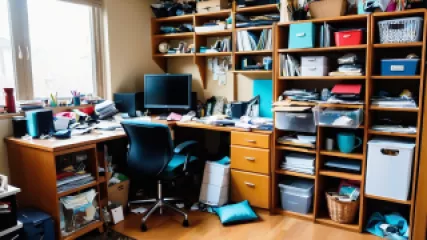Top 10 Emotional Effects of Clutter You Need to Know
Introduction:
Clutter can have a significant impact on our emotional well-being. It's not just about having a messy physical space; it can also affect us on a deeper level, causing stress, anxiety, and even depression. In this article, we will explore the top 10 emotional effects of clutter that you need to know. Understanding these effects can help motivate you to declutter and create a more organized environment for your mental health.
1. Overwhelm
One of the most common emotional effects of clutter is a feeling of overwhelm. When our physical space is cluttered, it can create a sense of chaos and make it difficult to focus or relax. The constant visual stimulation from clutter can exhaust our mental energy, leaving us feeling overwhelmed and unable to find peace.
2. Anxiety
Clutter has been linked to increased levels of anxiety. Living in a cluttered environment can make us feel constantly on edge, as our brains interpret the mess as a potential threat. The constant reminder of unfinished tasks and the inability to find what we need can contribute to a sense of unease and worry.
3. Stress
The presence of clutter can be a significant source of stress in our lives. Cluttered spaces often require more effort and time to navigate, leading to increased frustration and tension. The accumulation of clutter can also create a never-ending to-do list, adding to our stress levels as we struggle to keep up with the mess.
4. Lack of Focus
When our surroundings are cluttered, it becomes challenging to maintain focus and concentration. Our brains are easily distracted by the visual stimuli of clutter, making it difficult to stay on task or complete projects efficiently. This lack of focus can lead to decreased productivity and feelings of frustration.
5. Decreased Productivity
Clutter can have a significant impact on our productivity levels. When our physical space is cluttered, it becomes challenging to find what we need, wasting time and energy searching for misplaced items. The constant distractions from clutter also make it harder to stay focused and complete tasks efficiently.
6. Guilt and Shame
Living in a cluttered environment can evoke feelings of guilt and shame. We may feel embarrassed to invite others into our homes or be self-conscious about our inability to keep our spaces organized. The presence of clutter can also trigger a sense of guilt for not taking action to address the mess.
7. Lack of Motivation
Clutter can zap our motivation and make it difficult to start or complete tasks. The physical and mental energy required to tackle clutter can feel overwhelming, leading to procrastination and a lack of motivation. This lack of motivation can extend beyond just decluttering; it can affect our overall drive to accomplish goals and pursue our passions.
8. Depressive Symptoms
Research has shown a correlation between clutter and depressive symptoms. Living in a cluttered environment can contribute to feelings of sadness, hopelessness, and low mood. The constant reminder of disorder and the inability to find peace in our surroundings can take a toll on our mental health.
9. Difficulty Letting Go
Clutter can also have emotional effects related to our attachment to possessions. It can be challenging to let go of items, even if they no longer serve a purpose or bring us joy. The emotional attachment we place on objects can make decluttering a daunting task, further contributing to the accumulation of clutter and its negative effects.
10. Sense of Overload
A cluttered environment can create a sense of overload, both physically and mentally. The sheer volume of items and the disorganization can make us feel like we are drowning in stuff. This overload can lead to feelings of helplessness and a loss of control over our surroundings.
Summary:
Clutter has far-reaching emotional effects that can impact our overall well-being. From overwhelm and anxiety to stress and a lack of focus, clutter can take a toll on our mental health. Understanding these effects is the first step in motivating ourselves to declutter and create an organized space that promotes emotional well-being.






